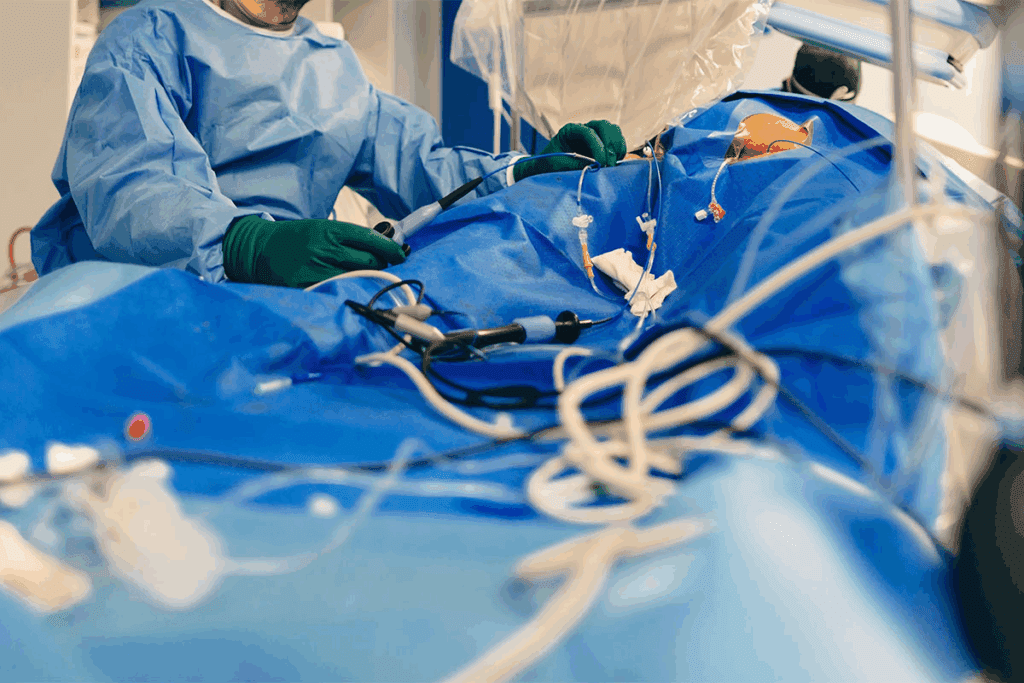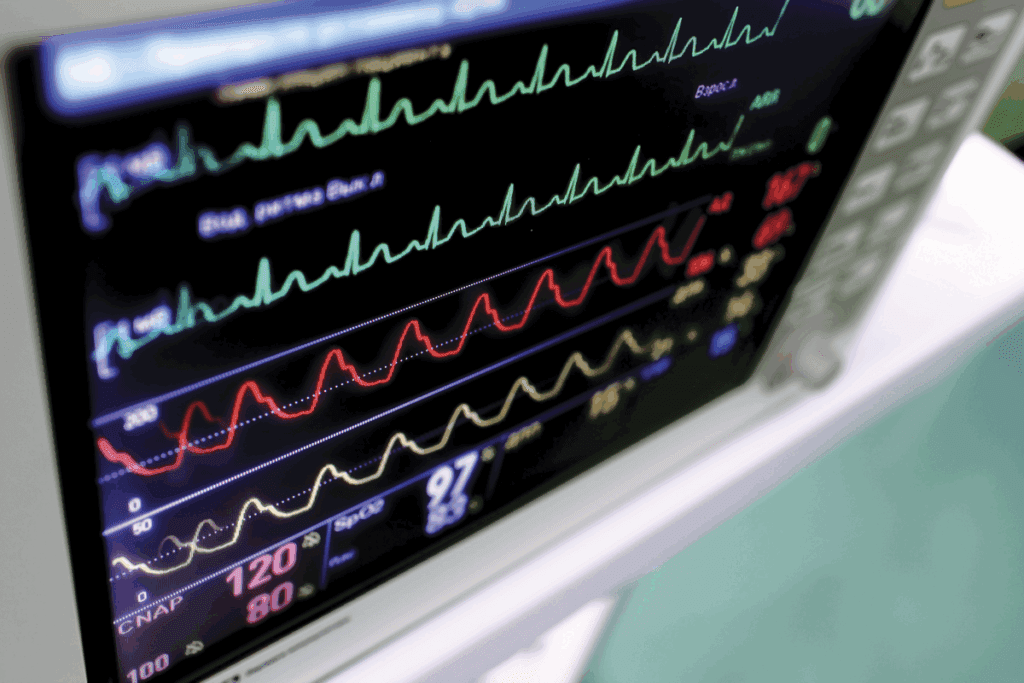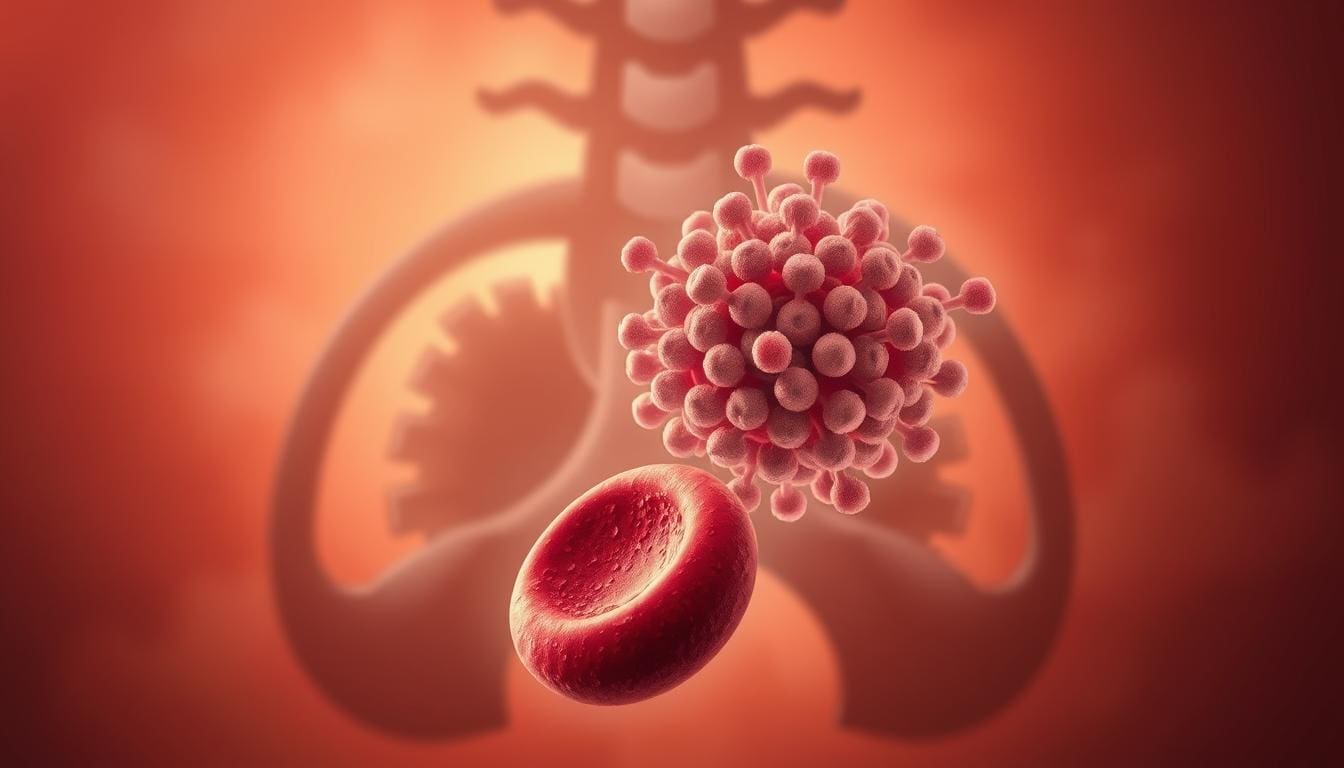
Atrial fibrillation (AFib) is a common heart condition. It causes irregular heart rhythms, or arrhythmias. Learn what AFib ablation is, how it works, and whether it can cure atrial af ablation effectively.
AFib ablation, or heart ablation for atrial fibrillation, is a small procedure. It aims to fix AFib by removing small heart tissue parts. This helps bring back a regular heart beat, making life better for those with AFib.
At Liv Hospital, we use top-notch skills and care for those thinking about ablation as a solution. We offer full support, from the first visit to after the procedure. Our goal is to make sure you get the best care.
Key Takeaways
- AFib ablation is a minimally invasive procedure to treat atrial fibrillation.
- The procedure targets and destroys heart tissue causing abnormal electrical signals.
- AFib ablation aims to restore a normal heart rhythm and improve quality of life.
- Liv Hospital offers expert care and support for patients undergoing AFib ablation.
- Internationally recognized expertise and patient-first values are at the core of our care.
Understanding Atrial Fibrillation: The Irregular Heartbeat Condition
Atrial fibrillation, or AFib, is a heart condition where the heart beats irregularly and fast. It happens when the heart’s upper chambers (atria) don’t beat in sync with the lower chambers (ventricles).
We will dive into the details of atrial fibrillation. This includes its symptoms and complications. We aim to give a full picture of this condition.
What Happens During Atrial Fibrillation?
In atrial fibrillation, the heart’s rhythm is broken. The atria quiver instead of beating regularly. This leads to symptoms like palpitations, shortness of breath, and fatigue.
Common Symptoms and Complications of AFib
The symptoms of atrial fibrillation vary. Common ones include:
- Heart palpitations or fluttering
- Shortness of breath
- Fatigue or weakness
- Dizziness or lightheadedness
- Chest pain or discomfort
Atrial fibrillation can cause serious complications. These include:
| Complication | Description |
| Stroke | Increased risk due to blood clots forming in the heart |
| Heart Failure | AFib can lead to reduced heart function over time |
| Other Heart-Related Complications | Includes conditions like coronary artery disease |
Knowing about atrial fibrillation is key to managing it well. It helps lower the risk of serious complications.
The Basics of AF Ablation: A Minimally Invasive Approach

AFib ablation is a new way to fix a heart rhythm problem. It targets the source of irregular signals. This method has changed how we treat atrial fibrillation, giving patients a chance for a cure.
Cardiac ablation, or AFib ablation, uses cutting-edge tech to find and stop bad electrical paths in the heart. It aims to fix the heart’s rhythm. This can make symptoms better and lower the risk of heart problems.
How Ablation Targets Abnormal Electrical Signals
The procedure uses thin, flexible tubes called catheters to reach the heart. These tubes go through a vein in the leg. Then, they send out energy to make small scars on the heart.
Key aspects of the ablation process include:
- Mapping the heart’s electrical pathways to identify areas causing the arrhythmia
- Delivering energy to specific areas to create lesions that block abnormal electrical signals
- Monitoring the heart’s rhythm in real-time to assess the effectiveness of the procedure
AFib ablation targets the heart’s problem spots well. It’s a very effective treatment for atrial fibrillation. It can make symptoms go away and improve life quality.
Types of Ablation Procedures for Atrial Fibrillation
There are several ablation procedures for atrial fibrillation. Each has its own way of working. They aim to create scar tissue that stops the abnormal electrical signals causing AFib.
Radiofrequency Ablation: Using Heat Energy
Radiofrequency ablation is a common treatment for atrial fibrillation. It uses heat energy to make lesions on the heart tissue. This blocks the abnormal electrical signals.
A catheter guides the procedure, entering the heart through blood vessels. The catheter sends out radiofrequency energy. This heats the heart tissue, creating scar tissue.
Cryoablation: The Freezing Technique
Cryoablation is another effective treatment for atrial fibrillation. It uses extreme cold to create lesions on the heart tissue. A catheter delivers a cold substance, like nitrous oxide, to the area.
The cold temperatures destroy the abnormal electrical pathways. This reduces atrial fibrillation. Cryoablation is as effective as radiofrequency ablation but may suit some patients better.
Both radiofrequency ablation and cryoablation are good options for atrial fibrillation patients. The choice depends on the patient’s condition and the doctor’s advice.
When Is Heart Ablation for Atrial Fibrillation Recommended?
When managing atrial fibrillation becomes tough with just medication, heart ablation is a good option. Atrial fibrillation (AFib) is a complex condition. While medication is often the first choice, some patients may not respond well or have big side effects.
Heart ablation is a minimally invasive procedure. It aims to restore a normal heart rhythm by destroying the abnormal electrical pathways in the heart tissue causing AFib. The decision to undergo ablation is made after considering the patient’s health, the severity of their AFib symptoms, and their response to other treatments.
Medication-Resistant AFib Cases
For patients with medication-resistant AFib, ablation is a promising solution. Medication resistance is declared when AFib symptoms persist despite anti-arrhythmic medications, or when the side effects are too much. In these cases, ablation can be an effective treatment, potentially reducing or eliminating the need for long-term medication.
Studies show that ablation can greatly improve the quality of life for patients with medication-resistant AFib. It can reduce symptoms and improve heart function. But, the success of the procedure depends on the patient’s health and the specific characteristics of their AFib.
Patient Selection Criteria for Ablation
The selection of patients for AFib ablation is based on a thorough evaluation. This includes the severity of symptoms, the presence of underlying heart conditions, and the patient’s response to previous treatments. Patient selection criteria are key to ensuring the best outcomes from the procedure.
Key factors considered in patient selection include:
- The duration and persistence of AFib
- The severity of symptoms and their impact on quality of life
- The presence of underlying heart disease or other comorbidities
- Previous treatments and their effectiveness
- The patient’s overall health and suitability for the procedure
By carefully evaluating these factors, healthcare providers can identify patients most likely to benefit from AFib ablation. This improves their chances of a successful outcome.
In conclusion, heart ablation for atrial fibrillation is recommended for patients who are resistant to medication or have significant side effects from their treatment. Understanding the patient selection criteria and the benefits of ablation helps us provide effective treatment options for those suffering from AFib.
The Ablation Heart Surgery Process: What to Expect
Getting ready for ablation heart surgery? It’s good to know what happens from start to finish. Knowing the steps can make you feel more at ease and ready for what’s ahead.
Pre-Procedure Preparation
Before the surgery, several steps are taken to keep you safe and ensure success. These might include:
- Tests like a transesophageal echocardiography (TEE) to check for heart clots.
- Changing or stopping some medicines that could affect the surgery or recovery.
- Following special diet rules, like fasting before the surgery.
It’s very important to listen to your doctor’s advice to reduce risks and get the best results.
During the Ablation Procedure
During the surgery, a catheter is used to send energy to the heart. The steps are:
- Getting sedation or anesthesia to stay comfortable.
- Putting a catheter through a vein in the groin to reach the heart.
- Using radiofrequency energy or cryoablation to make lesions in the heart tissue.
Recovery and Post-Procedure Care
After the surgery, you’ll be watched closely for any immediate issues. The care after includes:
- Resting and avoiding hard activities for a while.
- Watching for signs like chest pain, shortness of breath, or irregular heartbeats.
- Taking medicines as your doctor says.
Going to follow-up appointments with your doctor is key to track your healing and see if the surgery worked.
Success Rates: Can Ablation Cure Atrial Fibrillation?
When thinking about ablation for atrial fibrillation, it’s key to look at its success rates. Ablation is a big treatment for AFib, aiming to cure or greatly improve symptoms.
Short-Term vs. Long-Term Outcomes
Success in ablation is seen in both short and long terms. Short-term success means no AFib return in the first year. Many studies show it works well in the short term, cutting down AFib episodes a lot.
Long-term success is harder to measure, as it’s about staying free from AFib for years. Success rates for long-term range from 50 to 80 percent. This depends on the type of AFib and heart conditions.
Factors Affecting Success Rates
Many things can change how well ablation works for atrial fibrillation. These include:
- The type and length of AFib
- Presence of heart disease
- The patient’s health and age
- The skill of the doctor doing the ablation
Knowing these factors helps set the right expectations and make smart choices about ablation.
Healthcare providers can improve ablation success by carefully choosing who gets it. Patients should also follow care instructions after the procedure for the best results.
Potential Risks and Complications of Ablation for Atrial Fib
It’s important to know the risks and complications of AFib ablation before deciding on treatment. Ablation is very effective for many, but it comes with some risks.
Common Side Effects
Most people have some side effects after AFib ablation. These are usually mild and short-lived. Common side effects include:
- Discomfort or pain at the catheter site
- Fatigue: Feeling unusually tired or weak
- Mild swelling or bruising at the catheter insertion points
These side effects usually go away within a few days to a week after the procedure.
Serious Complications to Be Aware Of
While rare, serious complications can happen with AFib ablation. It’s important to know about these risks:
- Bleeding or hematoma at the catheter site
- Infection: Though rare, infections can occur and may require antibiotic treatment
- Damage to the heart or blood vessels: This can include puncture of the heart wall or damage to the valves
- Stroke or transient ischemic attack (TIA): The risk is higher in patients with certain pre-existing conditions
- Esophageal damage or atrio-esophageal fistula: A rare but serious complication
We take every precaution to minimize these risks. Our experienced team closely monitors patients during and after the procedure.
Talking to your healthcare provider about your individual risk factors is key. This helps understand how these risks might apply to you.
Life After Ablation of the Heart for AFib
The journey doesn’t end after ablation; it’s just the start of managing atrial fibrillation. Patients must navigate a new care landscape. This includes managing medications and making lifestyle changes for the best outcomes.
Medication Management Post-Procedure
After ablation, patients might need to keep taking medication. Medication management is key in the recovery period. The type and amount of medication depend on the patient’s needs and treatment goals.
- Anti-arrhythmic drugs may be prescribed to keep the heart rhythm normal.
- Anticoagulants are often continued to lower stroke risk.
- Patients should work closely with their healthcare provider to adjust medications as needed.
Patients need to stick to their medication regimen and report any side effects or concerns to their healthcare provider promptly.
Lifestyle Adjustments for Optimal Results
Lifestyle changes are important for the best results after ablation. A healthy lifestyle can make the procedure more effective and improve overall health.
Key lifestyle adjustments include:
- Maintaining a balanced diet rich in fruits, vegetables, and whole grains.
- Engaging in regular physical activity, such as walking or other aerobic exercises, as recommended by a healthcare provider.
- Managing stress through relaxation techniques, such as meditation or deep breathing exercises.
By combining medication management with these lifestyle adjustments, patients can optimize their recovery. This improves their quality of life after ablation.
Alternative Treatments When Ablation Isn’t Suitable
When ablation isn’t an option, managing atrial fibrillation requires looking at other treatments. For those not ideal for AFib ablation or who don’t want it, there are other ways to manage the condition.
Medication Options for AFib Management
Medications are key in managing atrial fibrillation symptoms and preventing complications. Anti-arrhythmic drugs help control heart rhythm. Beta-blockers and calcium channel blockers regulate heart rate. Also, anticoagulants prevent stroke, a big risk with AFib.
| Medication Type | Purpose | Examples |
| Anti-arrhythmic drugs | Control heart rhythm | Flecainide, Propafenone |
| Beta-blockers | Regulate heart rate | Metoprolol, Propranolol |
| Calcium channel blockers | Regulate heart rate | Diltiazem, Verapamil |
| Anticoagulants | Prevent stroke | Warfarin, Apixaban |
Other Procedural Approaches
Other procedures can also manage AFib. Cardioversion therapy uses a controlled electric shock to restore normal rhythm. AV node ablation with pacemaker implantation controls heart rate and keeps a regular beat.
These alternatives give patients with atrial fibrillation options when ablation isn’t an option. It’s important to talk to a healthcare provider to find the best treatment for you.
Conclusion: Is Heart Ablation Right for Your AFib?
Heart ablation is a promising solution for many with atrial fibrillation. It’s important to understand the basics of AFib, the ablation process, and the outcomes. This helps decide if it’s right for you.
Heart ablation is tailored to each person. Its suitability depends on your AFib severity, health, and past treatments. Always talk to a healthcare professional to find the best option for you.
By looking at the information in this article and getting advice from a doctor, you can make a smart choice. Heart ablation might be the right step for managing your AFib. This is just the start of your journey to better health.
FAQ
What is AFib ablation?
AFib ablation is a procedure to treat atrial fibrillation. It uses energy to destroy bad electrical pathways in the heart. This helps fix the irregular heartbeat.
How does ablation treat atrial fibrillation?
Ablation creates scar tissue in the heart. This scar blocks bad electrical signals. It stops the irregular heartbeat.
What are the types of ablation procedures for atrial fibrillation?
There are two main types. Radiofrequency ablation uses heat. Cryoablation uses cold energy.
Is ablation a cure for atrial fibrillation?
Ablation can be very effective. But, it’s not a cure for everyone. It depends on the condition’s severity and your health.
What are the risks and complications of ablation for atrial fibrillation?
Risks include bleeding, infection, and damage to the heart or tissues. There’s also a chance of stroke.
How do I know if I’m a candidate for ablation?
You might be a candidate if you have atrial fibrillation that doesn’t respond to meds. You should also be in good health.
What can I expect during the ablation procedure?
You’ll get sedation or anesthesia. The doctor will use a catheter to apply energy to the heart tissue.
What is the recovery time after ablation?
Recovery time varies. But, most people can get back to normal in a few days to a week.
Will I need medication after ablation?
It depends on your situation. Some people might need to keep taking meds to manage their condition.
Are there alternative treatments for atrial fibrillation?
Yes, there are. Options include medication and other procedures like cardioversion.
Can ablation cure atrial fibrillation long-term?
Success depends on many factors. These include the condition’s cause and your overall health.
What is the difference between radiofrequency ablation and cryoablation?
Radiofrequency uses heat to create scar tissue. Cryoablation uses cold energy for the same purpose.
How effective is ablation in treating atrial fibrillation?
Effectiveness varies. But, studies show it’s a highly effective treatment for many people.
References
National Center for Biotechnology Information. (2025). What Is AFib Ablation and Can It Really. Retrieved from https://pmc.ncbi.nlm.nih.gov/articles/PMC5135164/







